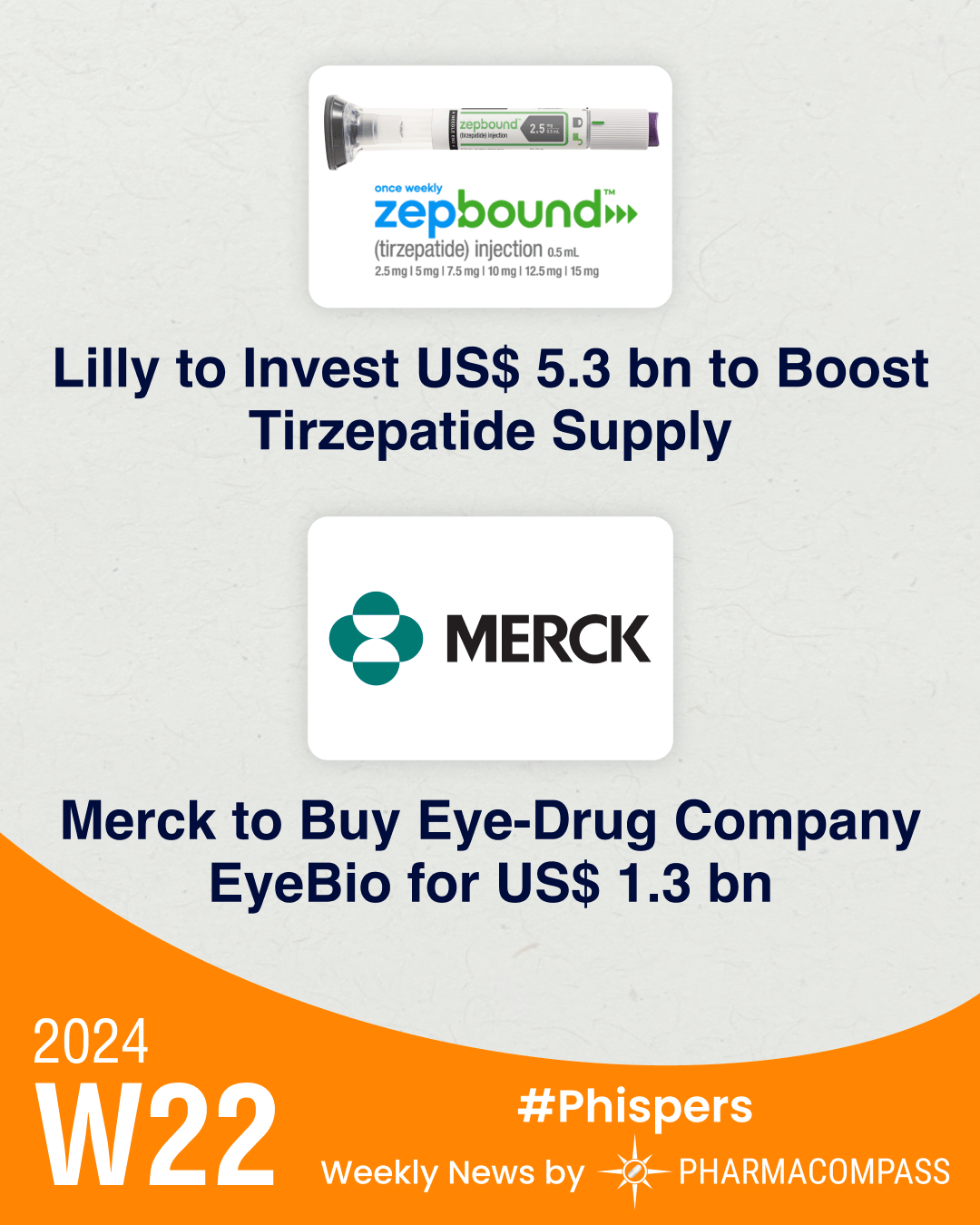
By PharmaCompass
2024-05-30
Impressions: 1,369 (Article) || 4 (Video)
This week’s Phispers comes packed with news of investments, acquisitions, deals and trials. Eli Lilly has more than doubled its investment at its Lebanon (Indiana) site in the US by investing an additional US$ 5.3 billion. This investment will enhance Lilly’s capacity to manufacture the active pharmaceutical ingredient (API) used in its obesity and type 2 diabetes drugs — Zepbound and Mounjaro.
In deals, Merck announced it is buying clinical-stage ophthalmology biotech EyeBio for US$ 1.3 billion. Johnson & Johnson has scooped up the rights to an eczema antibody for US$ 1.25 billion. Japanese conglomerate Asahi Kasei said it is buying Sweden’s Calliditas for US$ 1.1 billion. And, Takeda has inked a potential US$ 1.2 billion deal with Shanghai-based Degron Therapeutics to discover and develop a new class of drugs, known as molecular glue degraders (MGDs).
The US Food and Drug Administration (FDA) has approved a once-daily treatment to treat attention deficit hyperactivity disorder (ADHD) in patients who are six years of age or older. And, an FDA advisory panel has voted against the benefits of Novo Nordisk’s once-weekly Awiqli (insulin icodec) outweighing its risks.
At the European Renal Association (ERA) congress, Novo Nordisk presented detailed results that showed Ozempic reduced the risk of death due to kidney disease in people with diabetes. The ERA congress also saw Novartis tout two promising late-stage readouts for rare kidney disease treatments. And, preliminary results from a confirmatory trial showed NS Pharma’s Viltepso failed to reach its primary endpoint after it was given FDA’s accelerated approval to treat Duchenne muscular dystrophy.
Lilly to invest additional US$ 5.3 bn in US site to boost Zepbound, Mounjaro supply
The battle to gain a larger share of the obesity-diabetes pie just got fiercer. Eli Lilly has more than doubled its investment at its Lebanon (Indiana, US) manufacturing site with a new US$ 5.3 billion commitment. This raises Lilly’s investment at this site to US$ 9 billion, up from US$ 3.7 billion. This expansion will enhance Lilly’s capacity to manufacture the API — tirzepatide — for its Zepbound and Mounjaro injections so that more adults with chronic diseases like obesity and type 2 diabetes may benefit from these important treatments, the company said.
Merck set to buy clinical-stage ophthalmology biotech EyeBio for US$ 1.3 bn
Merck has announced it is buying ophthalmology biotechnology firm Eyebiotech Limited (EyeBio) for US$ 1.3 billion. The deal also includes US$ 1.7 billion in additional milestone payments. London-headquartered EyeBio’s lead candidate Restoret has finished early to mid-stage testing for diabetic macular edema (DME) and neovascular age-related macular degeneration (NVAMD).
J&J scoops up rights to eczema antibody for US$ 1.25 bn: Johnson & Johnson has agreed to buy the rights to an experimental skin disorder treatment from Numab Therapeutics for around US$ 1.25 billion. The therapy — NM26 — is phase 2-ready and targets two clinically proven pathways in atopic dermatitis (AD), commonly known as eczema. Last week, J&J had acquired Proteologix for US$ 850 million, which was also to help it address key unmet needs for AD patients.
Takeda inks potential US$ 1.2bn deal with Degron; Asahi Kasei to buy Calliditas
Japan’s Takeda has inked a deal with Shanghai-headquartered Degron Therapeutics to discover and develop novel molecular glue degraders (MGDs) for multiple targets in oncology, neuroscience, and inflammation. The deal could be valued at around US$ 1.2 billion. MGDs are an emerging class of potentially therapeutic compounds touted as exciting opportunities for novel drug discovery.
Meanwhile, Japanese conglomerate — Asahi Kasei — said it has offered to buy out Swedish drugmaker Calliditas Therapeutics for SEK 11.1 billion (US$ 1.1 billion) as the former seeks to become a global player in the pharma industry. Calliditas focuses on novel treatments for orphan indications and patients with unmet needs.
FDA okays Tris Pharma’s once-daily, non-stimulant pediatric ADHD drug
FDA has okayed Onyda XR (clonidine hydrochloride), a once-a-day treatment for attention deficit hyperactivity disorder (ADHD) for patients six years and older. This makes it the first liquid non-stimulant ADHD drug approved in the US. It is expected to be available in pharmacies in the second half of 2024.
FDA panel votes against Novo’s weekly insulin for type 1 diabetes
FDA’s advisory committee on endocrinologic and metabolic drugs has voted seven to four against the benefits of Novo Nordisk’s once-weekly Awiqli (insulin icodec). The panel said the benefits of Awiqli do not outweigh its risks. The Danish drugmaker was aiming to bring to market the first weekly insulin product, which would lower the treatment burden for diabetes patients. An increased risk of low blood sugar was flagged by the advisors in patients with type 1 diabetes.
Ozempic impresses in late-stage trial for kidney disease: Detailed results presented at the ERA congress and published in the New England Journal of Medicine showed Ozempic (semaglutide) lowered the risk of death in type 2 diabetes patients with chronic kidney disease. A late-stage trial with 3,533 people showed weekly semaglutide injections reduced kidney failure and death due to kidney complication by 24 percent.
Novartis tees up two rare kidney disease therapy approvals after late-stage wins
The ERA congress also saw Novartis tout two promising late-stage readouts for rare kidney disease treatments as it tees up two potential approvals in the renal therapy space. Interim results showed the Swiss drugmaker’s experimental drug atrasentan, along with supportive care, reduced proteinuria (elevated protein in the urine) by 36.1 percent in patients with IgAN. Novartis plans on applying for FDA’s approval in the first half of this year.
The other drug is Fabhalta (iptacopan), which was being trialed in patients with the ultra-rare kidney disease C3 glomerulopathy (C3G). In combination with supportive care, Fabhalta lowered proteinuria by 35.1 percent at six months. C3G currently has no approved therapies.
NS Pharma’s DMD drug fails confirmatory trial: Preliminary results from a confirmatory trial show NS Pharma’s Viltepso (viltolarsen) has failed to reach its primary endpoint after it was given FDA’s accelerated approval in August 2020 to treat Duchenne muscular dystrophy (DMD). However, NS Pharma remains confident in viltolarsen and said it is “conducting further detailed data analyses”.
Four deaths mar J&J’s prostate cancer trial: Johnson & Johnson’s experimental prostate cancer drug that uses a rare radioactive particle called actinium-225 has helped three patients by reducing their tumors significantly. However, those results were marred by the death of four patients in the early-stage study. The first-in-human study concluded that “JNJ-6420 elicited profound and durable biochemical and radiographic responses.” However, 61 percent of the participants experienced grade 3 or higher treatment-emergent adverse events.
The PharmaCompass Newsletter – Sign Up, Stay Ahead
Feedback, help us to improve. Click here
Image Credit : Phisper Infographic by PharmaCompass license under CC BY 2.0
“ The article is based on the information available in public and which the author believes to be true. The author is not disseminating any information, which the author believes or knows, is confidential or in conflict with the privacy of any person. The views expressed or information supplied through this article is mere opinion and observation of the author. The author does not intend to defame, insult or, cause loss or damage to anyone, in any manner, through this article.”







